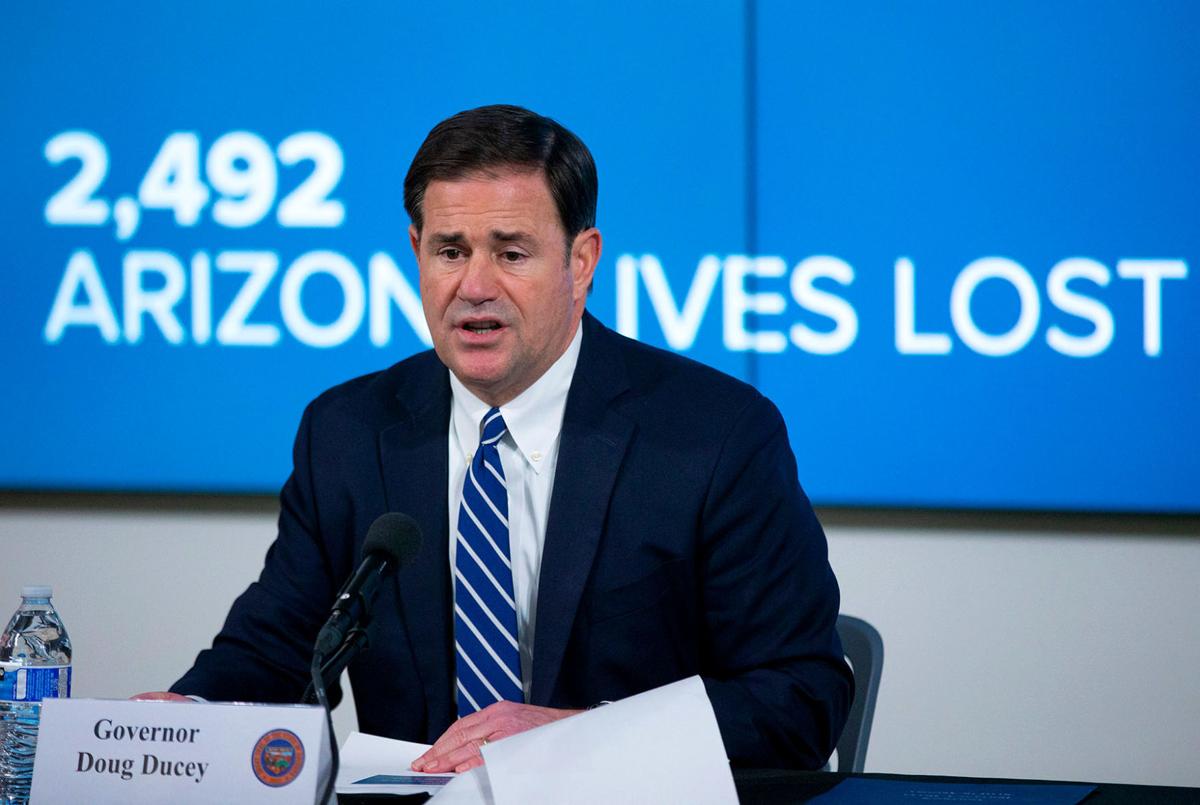PHOENIX — Arizonans who can’t pay their rent because of COVID-19 fallout will get more time before they face eviction, Gov. Doug Ducey announced Thursday.
Ducey also said at his news conference that:
- He won’t implement the latest recommendations from the Centers for Disease Control and Prevention recommending that Arizona further reduce restaurant capacity and limit crowd sizes to control spread of the virus.
- He remains opposed to issuing a statewide mask order, saying giving the option to local governments is a better alternative.
- The percentage of COVID-19 tests that come back positive — a figure that has pushed Arizona to the top nationally — will decrease as the state starts testing people who are not sick or showing symptoms.
- He is counting on Congress to approve another aid package, including extended unemployment benefits, meaning he need not decide now whether to boost state-provided payments, which are the second-lowest in the nation.
- And he and state Health Director Cara Christ both said the fact that the Maricopa County Medical Examiner’s Office has run out of space and has ordered refrigerator trucks to store bodies can’t be blamed solely on the pandemic.
Eviction moratorium extended
Ducey is extending his executive order preventing renters affected by COVID-19 from losing their homes. That protection, which started in March and had been set to expire next week, now goes through Oct. 31.
There will, however, be some additional conditions that such renters must meet.
Right now they need to provide evidence to the property owner that they have specific reasons for not paying their rent. These range from a requirement to be quarantined, to job loss or reduction of income.
Under Ducey’s new order, they also will have to certify to the landlord by Aug. 22 that they have applied for rental assistance from one of the state, county, city or private organizations providing it.
That will keep the landlord at bay, even if the tenants don’t actually have the assistance by that time.
Ducey’s order also is designed to provide financial aid to at least some property owners, setting aside $5 million in grants.
“This will provide targeted relief to homeowners who rely on income from tenants to help them avoid foreclosure,” Ducey said.
The new executive order does not spell out which property owners are eligible. But aides to the governor said the plan is for the aid to be available only to those with one or just a few properties, and not to owners of apartment complexes.
Ducey said he is also providing $650,000 to community agencies that process applications for housing assistance.
He said there is about $80 million available in such assistance. But the governor’s office said that distribution has been hampered because these community agencies, such as Chicanos Por La Causa and Wildfire, have not had the staff to process the applications. The additional dollars would be earmarked to make those hires.
Some improving indicators
Ducey focused on the status of the virus in Arizona and said many indicators show the situation is improving here. These include fewer emergency room visits by COVID-19 patients and reports showing the rate of infection is declining here.
Still, Ducey acknowledged, the number of COVID-19 patients in hospital beds, including ICU wards, is increasing.
But he said he’s not interested in implementing the latest Arizona-specific CDC recommendations published earlier this week.
These include limiting indoor dining at restaurants to no more than 25% capacity and prohibiting gatherings of more than 10 people. By contrast, Ducey’s current orders allow restaurants to seat up to 50% of capacity and allow gatherings of 50.
The CDC’s guidelines are “recommendations,” Ducey said when asked about them. He noted it has been less than a week since he issued an edict tightening up on a prior order limiting in-restaurant dining.
“We’re seeing the results that we’re seeing over the last two weeks,” the governor said. “So we’re going to continually monitor it.”
The issue is not strictly about numbers and percentages, he said: “The key is to socially distance and make those responsible decisions.”
Unemployment benefits
Ducey’s announcement of extending his anti-eviction order comes as the extra $600 a week in unemployment benefits provided by the federal government is set to expire at the end of the month. Unless extended, that leaves Arizonans out of work with only state benefits, which are capped at $240 a week, the second lowest in the country.
Ducey sidestepped questions about seeking an increase in state benefits, which would require approval from the state Legislature, saying he hopes not to have to deal with that.
“This is something we’ve been talking with the (congressional) delegation about, talking with the White House about,” the Republican governor said. He said he’s counting on another financial relief package coming out of Washington.
“We’re not exactly sure what it’s going to be,” he said.
Morgue capacity
All of this comes as Maricopa County ordered up refrigerator trucks when its morgue hit its capacity of 150 bodies, something that hasn’t happened in a decade. Ducey said that does not mean his pandemic actions so far have been inadequate.
“We are headed in a better trajectory,” he said.
Christ said the situation of too many bodies can’t be blamed entirely on the pandemic. Part of the issue is that more people die in the summer of heat-related illnesses, she said.
“We are seeing an increase in drug overdose and in suicide, not just here in Arizona but nationally,” she also said. Some of that, Christ said, could be associated with the isolation and loneliness caused by COVID-19 as travel and visitation are limited.
“That is one of the things we were worried about,” she said.




